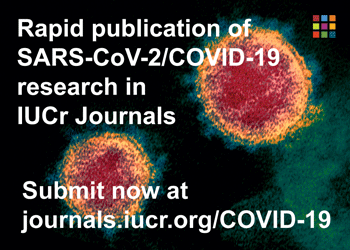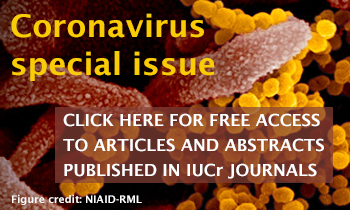issue contents
January 2021 issue

scientific commentaries
MATERIALS | COMPUTATION
The potential for convolutional neural networks to provide real-time imaging capabilities for coherent diffraction imaging experiments at XFELs is discussed.
feature articles
CHEMISTRY | CRYSTENG
In this text based on the 2018 Lonsdale lecture, beginning with early work by Kathleen Lonsdale, instructive examples are given of unusual and unexpected structures derived from X-ray crystallography, not all of which are genuine results.
research papers
MATERIALS | COMPUTATION
Machine-learning approaches can greatly facilitate single-particle-imaging experiments at X-ray free-electron-laser facilities by providing real-time images from the coherent X-ray diffraction data stream, using methods presented in this article.
BIOLOGY | MEDICINE
Using small-angle neutron scattering with contrast-matching of the lipidic cubic phase (LCP) bilayer, we determined that bacteriorhodopsin (bR) and detergents are largely dissociated upon incorporation into the LCP. This implies that the crystallization of membrane proteins in LCP is relatively insensitive to the choice of detergent, unlike the solution case, and this was experimentally verified with several detergents for bR.
CHEMISTRY | CRYSTENG
The atomic, magnetic and nano-structure of hydrothermally synthesized non-stoichiometric spinel iron oxide nanoparticles are examined in detail using a wide range of advanced structural characterization methods. The present study constitutes the first use of the recently developed magnetic pair-distribution-function analysis method to model the local magnetic structure in nanoparticles.
BIOLOGY | MEDICINE
Download citation


Download citation


The joint neutron/X-ray crystallographic structure of perdeuterated Aspergillus flavus urate oxidase in complex with the inhibitor 8-azaxanthine and a catalytic water bound in the peroxo hole is presented together with an integrated analysis using biomolecular simulations.
CRYO | EM
The incorporation of prior knowledge about the structures of biological macromolecules into the reconstruction process of cryo-EM structure determination is proposed. Using a novel algorithm inspired by regularization by denoising, it is shown how convolutional neural networks can be used within this framework to improve reconstructions from simulated data.
NEUTRON | SYNCHROTRON
Download citation


Download citation


The in vivo lifelong stability of an amphibole asbestos fibre extracted from a lung of a patient affected by malignant mesothelioma has been verified using synchrotron X-ray micro-diffraction.
CHEMISTRY | CRYSTENG
Download citation


Download citation


The crystal structure of decagonite, Al71Ni24Fe5, the only known natural decagonal quasicrystal found in a meteorite formed at the beginning of the Solar System is reported. The structural model obtained shows peculiarities and slight differences with respect to those obtained for other synthetic decagonal quasicrystals.
CCDC reference: 2045893
NEUTRON | SYNCHROTRON
A general method to calculate the elastic deformation and X-ray diffraction curves of arbitrarily shaped, toroidally bent crystal wafers based on the free-energy minimization is presented.
MATERIALS | COMPUTATION
Download citation


Download citation


The hydrogen disorder in kaatialaite mineral Fe[AsO2(OH)2]5H2O from Jáchymov, Czech Republic, is reported. A new analysis using 3D electron diffraction at low temperature demonstrates that even partial hydrogen positions are accessible among heavy atoms from the refinement of 3D electron-diffraction data, even when ignoring the dynamical effects.
CCDC reference: 2047162
NEUTRON | SYNCHROTRON
Nanosecond X-ray photon correlation spectroscopy using pulse time structure of a storage-ring source
Nanosecond XPCS study of fast colloidal dynamics is demonstrated by employing the intrinsic pulse structure of the storage ring with AGIPD. Correlation functions from single-pulse speckle patterns with the shortest correlation time of 192 ns have been measured, providing an important step towards routine ultrafast XPCS studies at storage rings.
BIOLOGY | MEDICINE
The dietary compound resveratrol is an inhibitor of death-associated protein kinase 1.
CHEMISTRY | CRYSTENG
Download citation


Download citation


Two phase transitions of commensurately modulated Na(sac)(15/8)H2O have been discovered upon cooling. All three phases involve complex disorder. The crystal exhibits an unusual reentrant disorder upon cooling through the first phase transition at 130 K.
CCDC reference: 2048319


 journal menu
journal menu




 access
access



























